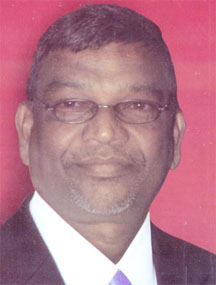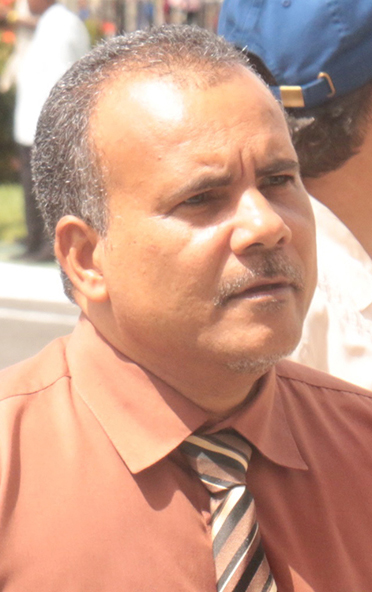Former New Building Society (NBS) manager Kent Vincent was sacked in 2007, not because of any inefficiency in his performance, but rather partly because of his refusal to attend a meeting called by Board of Directors of the financial institution.
This was the testimony on Tuesday by Director of the NBS, Dr Nanda Gopaul, who was at the time testifying in the lawsuit filed against the bank by Vincent, who is challenging his dismissal.
Vincent was one of three managers dismissed back in 2007 over a $69 million fraud at the institution and who were all subsequently charged with conspiracy to defraud the institution.

It was the bank’s claim that the trio—Vincent, Maurice Arjoon and Kissoon Baldeo were involved in the fraud pertaining to the withdrawal of that sum from the account of an NBS customer.
Apart from being cleared of the charges, a report by Ombudsman, former Justice Winston Moore had found that a grave injustice had been done to the former managers as there was no evidence to sustain the charge of conspiracy to defraud which was eventually brought by the police against the trio.
The men all subsequently sued the NBS, challenging their dismissal.
Responding to questions from Vincent’s attorney, Senior Counsel Robin Stoby, Gopaul said that in addition to “other things,” Vincent was partly dismissed because of his refusal to attend a meeting of the Board of Directors of the bank.
This response prompted counsel to enquire whether there was anything in his client’s employment contract which stated that he could be dismissed for not attending such a meeting.
In fact, pointing to a correspondence which Vincent had penned to the bank which Gopaul said was received by the NBS, Stoby sought to enquire from the witness whether Vincent had not requested an adjournment of that meeting to attend at a subsequent date, though the bank never acknowledged.
To this Gopaul answered in the affirmative.
Meanwhile, to the former enquiry, the Director said that it was a general requirement as part of Vincent’s contractual obligations which speaks of serving the NBS fairly and honestly, and making oneself available if asked to meet with the directors.
The witness made it clear that he was relying on this clause in the employment contract to substantiate the bank’s decision for, in part, dismissing Vincent for not attending the meeting when asked to so do.
But Stoby then point out, and the witness conceded, that that request from the bank was made after his client had already been suspended and was under threat of criminal proceedings and sanctions.
Nonetheless, Gopaul sought to advance that the dismissal had nothing to do with the criminal proceedings, while maintaining that Vincent was asked to attend the meeting to provide certain clarifications on spending and the like, but failed to do so.
When asked, the witness told Stoby that he knew at that point that Vincent had been charged and placed before the Magistrates Court with fraud.
Counsel then asked the witness if he did not find it strange to expect Vincent to compromise his defence by meeting with the bank.
“He (Vincent) did not say so,” was the Director’s response.
Stoby then asked the witness, and he confirmed, if the bank had not received a correspondence from Vincent explaining that he had been advised by his lawyer at the time that since the matter had been before the court, he ought not to have spoken to anyone about it.
Stoby then asked Gopaul what rules were breached by his client to warrant his dismissal as he sought to ascertain whether his performance was in anyway called into question.
To this, the Director said that the bank’s management deliberated on the matter, and based on the evidence before it, a decision was taken to dismiss Vincent.
According to Gopaul, Vincent had no right to sue the bank before first meeting with it. His explanation was that this move by Vincent caused embarrassment and irreparable harm to the financial institution.
The Director clarified that it was not that the sacked manager did not have a right to sue, but that he would have violated bank-policy to so do without first meeting with the bank, and this was a source of the embarrassment caused to it.
Stoby then asked why in the face of his client’s request for an adjournment he was still dismissed. However, Gopaul maintained that Vincent was not dismissed because of the request for the adjournment, but rather, because of his refusal to meet with the bank when asked.
NBS is being represented by attorney Devindra Kissoon.
The trial is being heard by acting Chief Justice Roxane George SC at the High Court in George-town where it will continue on May 29th.
While Vincent and Baldeo’s trials are still ongoing, Arjoon’s was completed in July of 2017.
Ruling that he had been “wrongfully dismissed,” Justice Brassington Reynolds had found that Arjoon was entitled to recover all benefits lost as a result of the bank’s decision to fire him.
To this end, the judge awarded him $59M which the bank has since paid over, but only after Arjoon levied on its assets.
The NBS has since appealed Justice Reynolds’ ruling which is still pending before the Guyana Court of Appeal.





